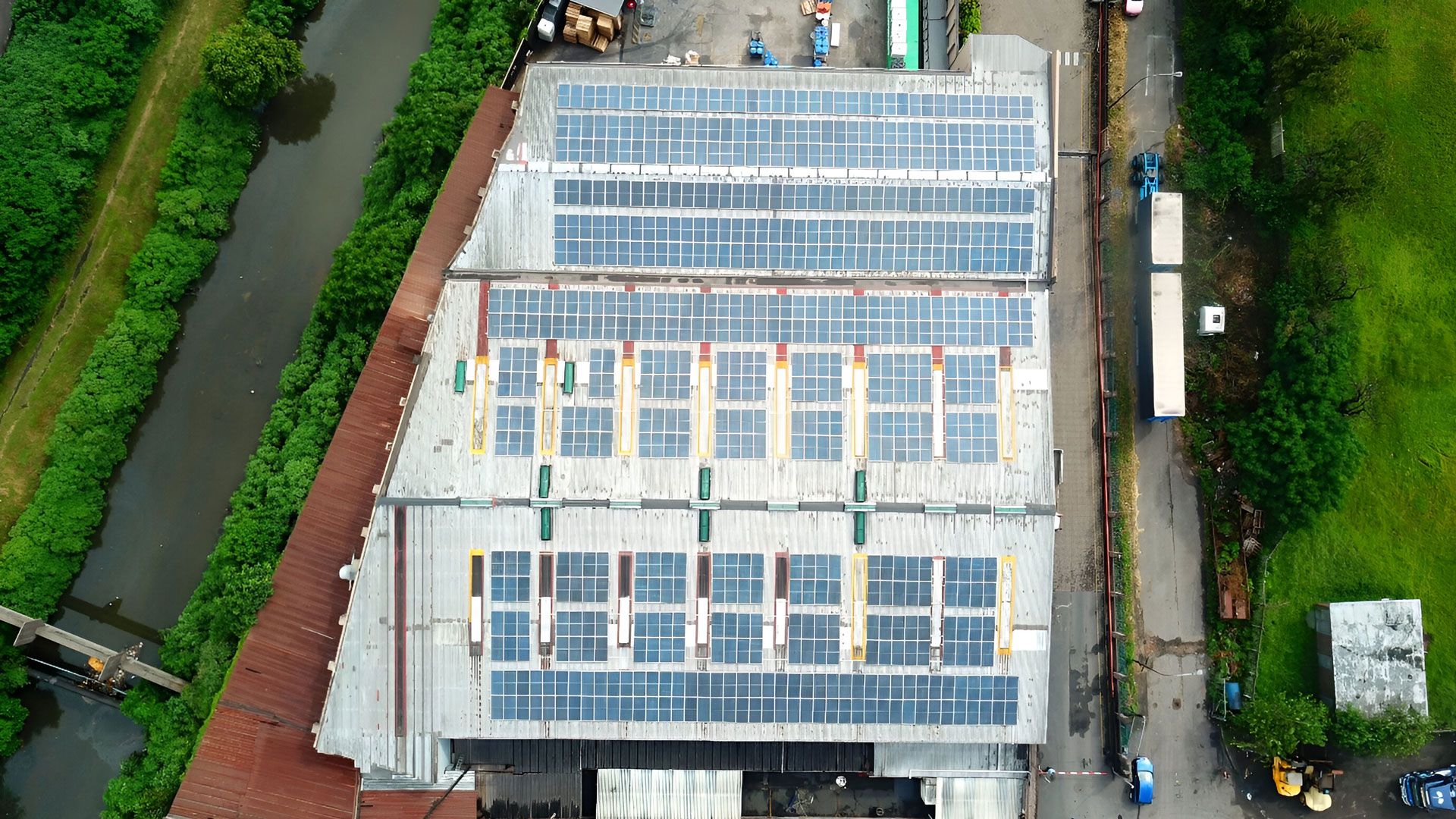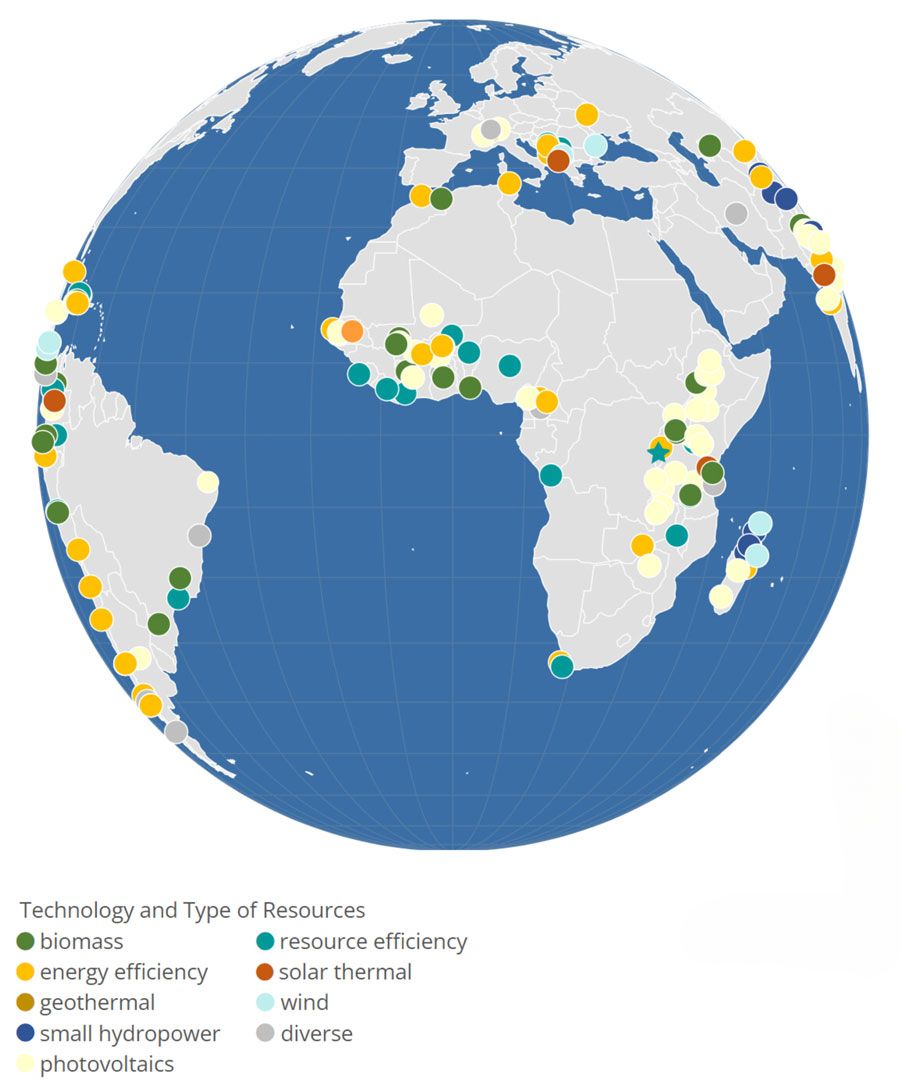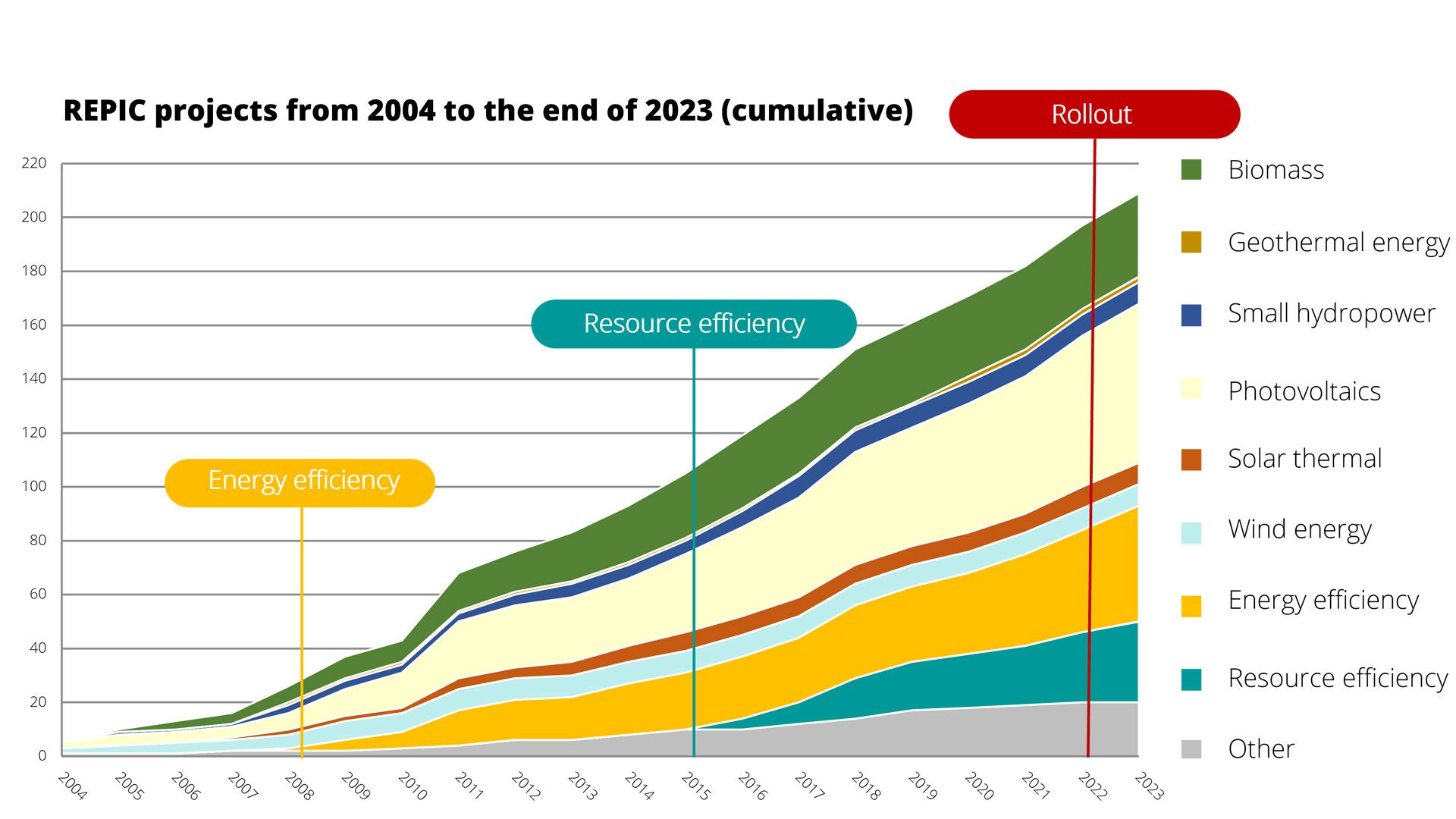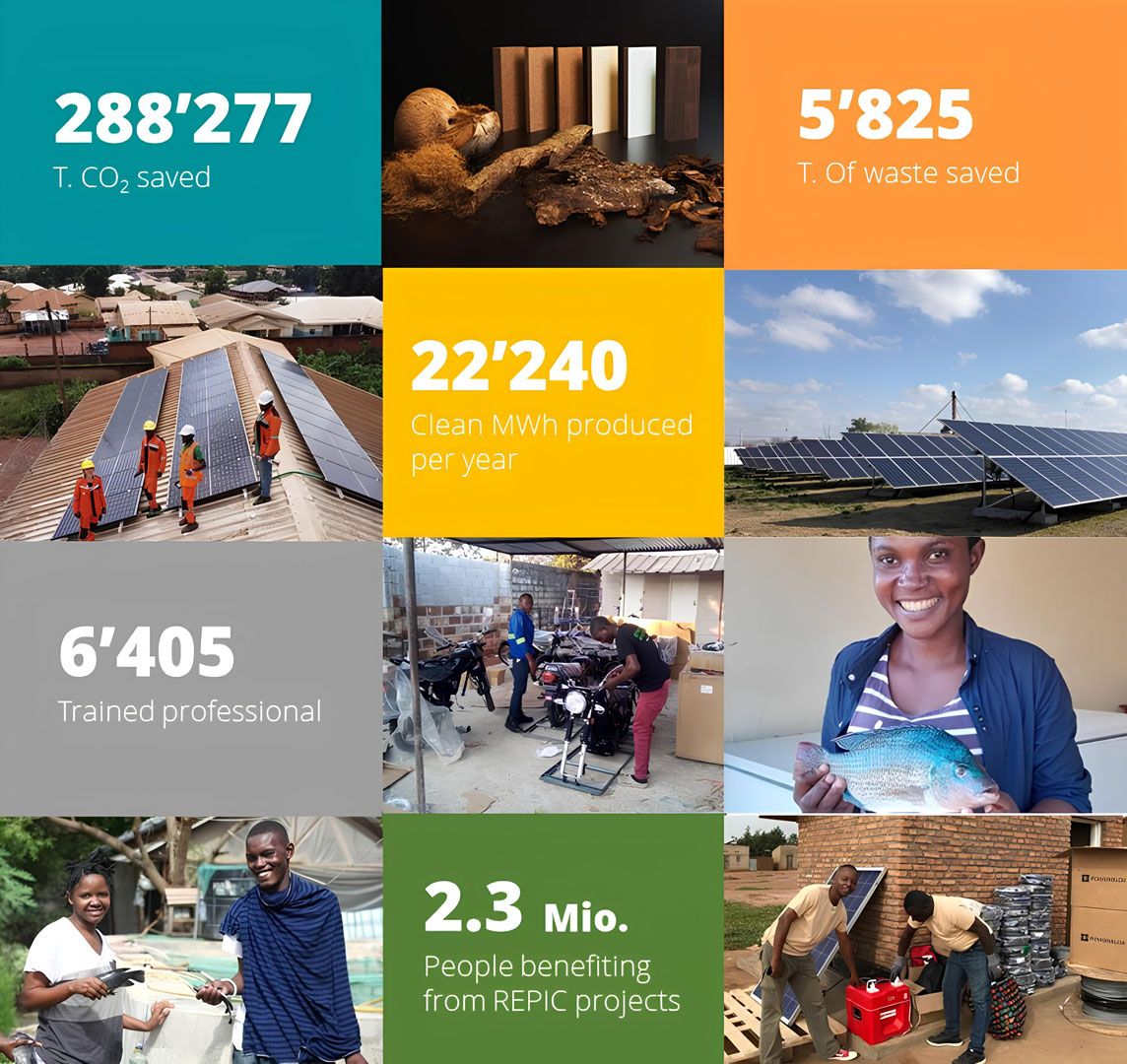REPIC: 20 Years of innovation for sustainable and global solutions
The interdepartmental platform REPIC has been developing sustainable solutions in various countries, particularly in the Global South, for 20 years. This anniversary is a good time to take a look back at the platform's promotion of renewable energy, energy efficiency and resources within international cooperation.

In 2004, Switzerland launched an innovative project called ‹Renewable Energy, Energy and Resource Efficiency Promotion in International Cooperation› (REPIC). The interdepartmental REPIC platform brings together the State Secretariat for Economic Affairs (SECO), the Swiss Agency for Development and Cooperation (SDC), the Federal Office for the Environment (FOEN) and the Swiss Federal Office of Energy (SFOE). Its aim is to support initiatives in renewable energy, energy efficiency and sustainable resource management in low- and medium-income countries. Since it was set up two decades ago, REPIC has supported over 200 projects in 60 countries, benefiting 2.3 million people. It has reduced CO2 emissions by 288,277 tonnes and provided training for more than 6,400 people. The platform is based on the UN's 2030 Agenda and its Sustainable Development Goals (SDGs). REPIC promotes projects that deliver sustainable ecological, economic and social benefits to as many people as possible.

A unique model of innovation
From the outset, REPIC has relied on public-private collaboration, allowing companies, NGOs and local partners to come together with a common goal: to develop tangible solutions to environmental challenges, integrating the economic, social, environmental and energy aspects of sustainability. The platform's synergy is undoubtedly one of its greatest strengths. The annual energy output of REPIC-backed projects is 22,240 MWh, which corresponds to the annual average consumption of 20,000 urban households in Senegal. As such, the platform is having a significant impact in this area.
In addition to financial support, REPIC provides a framework for Switzerland and its partner countries to share expertise. Each project supported must meet certain criteria. In order to qualify, it must
- be located in a developing or transition country
- operate in one of REPIC's focus areas
- meet local needs
- demonstrate innovation
- involve the transfer of Swiss knowledge and technology
- have objectives, activities and measurable milestones
- lend itself to multiplication/replication
- be sustainable (economic, social and environmental)
- be a Swiss entity
- REPIC contribution must not exceed 50% of total budget
In addition, the objectives, activities and progress indicators must be measurable, with potential for duplication/replication, while ensuring economic, social and environmental sustainability. Lastly, the organisation must be Swiss and REPIC's contribution must not exceed 50% of the total budget.

Two examples of projects supported by REPIC
The Swiss NGO Nouvelle Planète, established in 1986, supports the efforts of marginalised rural communities to sustainably improve their living conditions while protecting the environment. With REPIC's support, it has implemented a project to promote biogas in five municipalities in Trà Vinh province, Vietnam. This project is helping to combat deforestation, reduce pollution from livestock excrement and improve the health of families by reducing their dependence on firewood. Today, 491 families – far more than the 321 planned – use biogas for cooking, which allows them to lower their expenses and improve their quality of life. By reusing the digestate as a natural fertiliser, the project maximises local resources and improves agricultural productivity, creating a sustainable system that embodies REPIC's vision: local solutions with a strong social and environmental impact.
In India, REPIC has supported the company CANDI in installing solar panels on the roofs of local factories, a successful initiative in line with the platform's objectives. The aim is to reduce companies' dependence on fossil fuels while cutting their energy costs. And the outcome has been a significant reduction in CO2 emissions – almost 90,000 tonnes avoided to date thanks to CANDI's solar projects in India – and greater energy autonomy for the industry.
These two examples illustrate just some of REPIC's many achievements in Sub-Saharan Africa, Latin America, Eastern Europe and Asia. They provide practical solutions to problems in a variety of areas: access to clean energy, waste management and sustainable agriculture.
Between continuity and renewal
REPIC has been helping renewable energy pilot projects kick off and develop since 2004. In 2022, the platform took a new step forward with the introduction of ‹Rollout›, a tool that supports projects in the early marketing phase, strengthening their impact and viability. The instrument has filled the ‹valley of death› gap in project funding, which refers to the frequently seen difficulty in financing the transition from successful prototype to marketed product. Thanks to ‹Rollout›, REPIC helps projects overcome such obstacles by supporting critical activities such as industrialising production, transferring expertise and setting up distribution.
Thanks to REPIC's support, our indigenous fish farming project on Lake Tanganyika in Tanzania has made the journey from pilot to marketing, becoming the very first project supported under the ‹Rollout› programme. This support is allowing us to overcome the initial marketing challenges by integrating AQUASMART, a digital tool for better managing energy supply, into our processing and by extending the fresh fish distribution network using a solar-powered ice machine.
‹Rollout› thus enables innovative projects like Sustain Switzerland to move from the pilot stage to marketing, ensuring their viability and making them more attractive to private investors. For example, Sustain Switzerland's project in Tanzania to develop a solar-powered aquaculture farm benefited from this support, managing to overcome the challenges of generating and accessing energy in an isolated region.
At the same time, the increased budget allocated to REPIC (CHF 2.8 million for pilot projects and 'Rollout') bears witness to the renewed confidence placed in the platform by SECO, the FOEN, the SFOE and the SDC, thereby strengthening its role in promoting sustainable technologies.

An inspiring success story
Over two decades, REPIC has demonstrated that interdepartmental collaboration can bear fruit, transforming challenges into opportunities by supporting innovative local projects with international reach. REPIC-backed initiatives have improved the daily lives of hundreds of communities while helping to combat climate change.
With increasingly ambitious projects and a reinforced framework to ensure that the solutions in place are sustainable, REPIC illustrates Switzerland's commitment to promoting sustainable technologies and a more environmentally-friendly future.
Links
Contact
Eichenweg 5
3003 Bern

